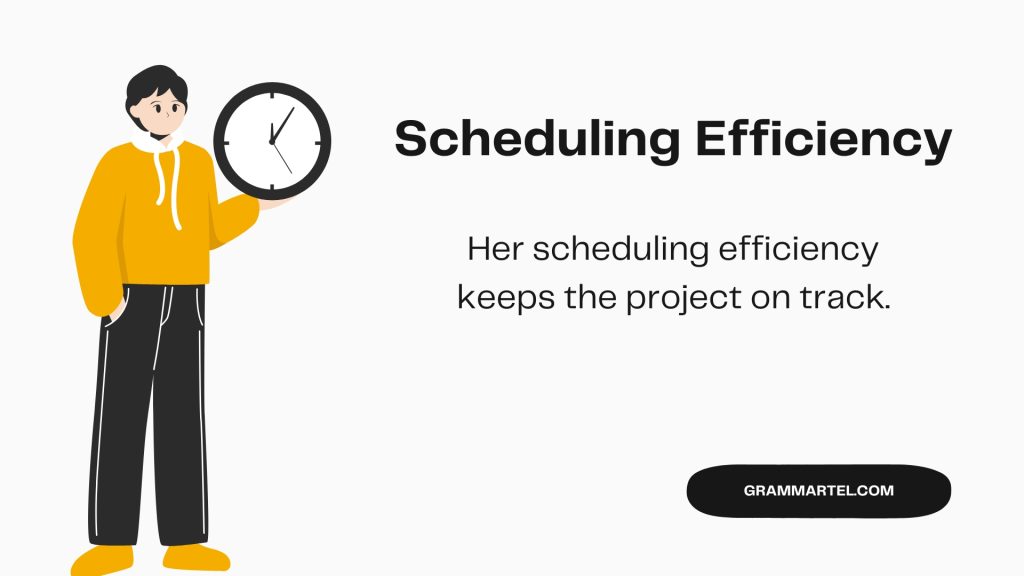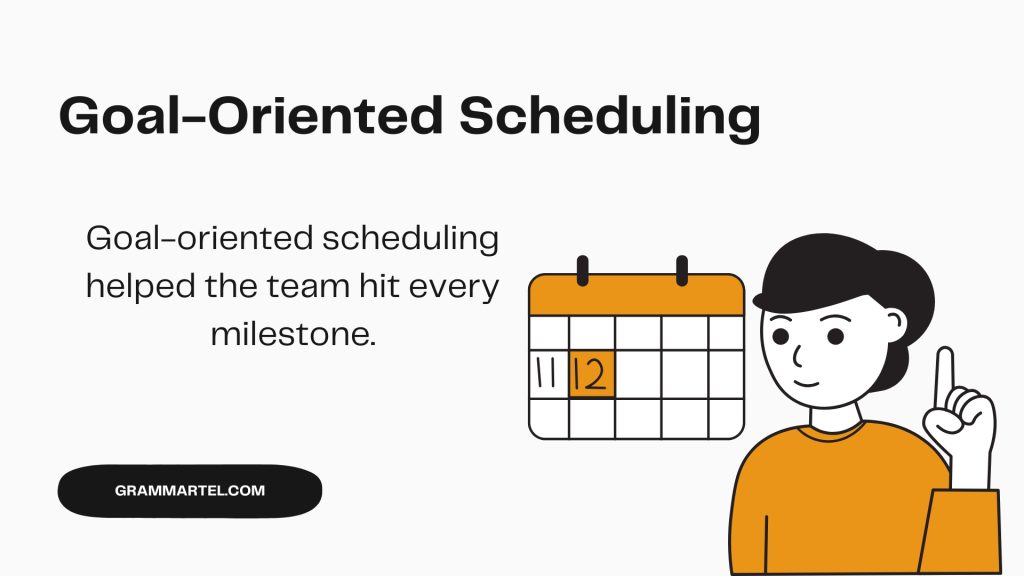Time is one thing we can’t make more of, yet it slips away so easily. That’s why the way we talk about “time management” matters—especially in work, school, or everyday life. But saying the same phrase over and over can feel dull. There are plenty of other ways to express the same idea, from casual terms to professional ones. In this guide, we’ll explore 40 different ways to say “time management,” complete with examples, so your language stays fresh and clear.
What Does “Time Management” Mean?
Time management is the practice of organizing and planning how you spend your hours so you can work more effectively. It’s not just about getting more done—it’s about making smart choices with your time. That might mean setting priorities, scheduling tasks, or cutting out distractions. Good time management helps reduce stress, meet deadlines, and balance work with personal life.
When to Use “Time Management”
You’d use the term “time management” in situations where organizing tasks and schedules is important. It comes up in workplaces, schools, and personal productivity discussions. For example, you might mention time management in a job interview, while giving advice to students, or when discussing project deadlines. It’s most common in professional or educational settings, but it also applies to everyday routines—anywhere planning time well makes a difference.
40 Best Ways to Say “Time Management”
1. Scheduling Efficiency

Meaning: The ability to plan tasks with minimal wasted time
Explanation: Focuses on streamlining schedules to fit tasks effectively
Example: “Her scheduling efficiency keeps the project on track.”
Best Use: Productivity blogs, performance reviews
Worst Use: Casual conversation
Tone: Professional, precise
2. Calendar Control
Meaning: Keeping tight oversight of one’s schedule
Explanation: Implies mastery over appointments and commitments
Example: “With better calendar control, he was able to attend every meeting on time.”
Best Use: Coaching, business planning
Worst Use: Academic essays
Tone: Casual-professional
3. Time Allocation
Meaning: Distribution of time to specific activities
Explanation: Neutral term emphasizing the planning phase
Example: “Time allocation for each subject helped her study effectively.”
Best Use: Strategic planning documents
Worst Use: Motivational speech
Tone: Technical
4. Schedule Mastery
Meaning: Skillful control of one’s time
Explanation: Suggests proactive and confident scheduling
Example: “Her schedule mastery makes her incredibly productive.”
Best Use: Self-help guides, time management books
Worst Use: Academic journals
Tone: Confident, slightly casual
5. Task Prioritization
Meaning: Ranking tasks by importance or urgency
Explanation: Highlights decision-making in how time is spent
Example: “Through task prioritization, he tackled the most urgent issues first.”
Best Use: Time management training
Worst Use: Romance novel dialogue
Tone: Practical
6. Productivity Planning
Meaning: Structuring time to increase efficiency
Explanation: Combines time use with measurable output
Example: “Her productivity planning gave the team a huge edge.”
Best Use: Business productivity workshops
Worst Use: In poetry
Tone: Professional, goal-oriente
7. Daily Structuring
Meaning: Organizing one’s day
Explanation: Implies a focus on the everyday timeline
Example: “Daily structuring helped reduce his stress levels.”
Best Use: Wellness or lifestyle coaching
Worst Use: Legal documents
Tone: Informal to semi-professional
8. Routine Optimization
Meaning: Refining daily habits for efficiency
Explanation: Focuses on tweaking existing patterns
Example: “Routine optimization saved her an hour every morning.”
Best Use: Habit-building discussions
Worst Use: Government reports
Tone: Optimistic, practical
9. Workload Management
Meaning: Balancing and organizing tasks
Explanation: Covers both quantity and timing of work
Example: “Good workload management helped prevent burnout.”
Best Use: HR training materials
Worst Use: Fiction writing
Tone: Formal
10. Priorities Alignment
Meaning: Matching time use with goals
Explanation: Ensures time goes toward what matters
Example: “Her priorities alignment made her week more meaningful.”
Best Use: Goal-setting content
Worst Use: Casual emails
Tone: Reflective, structure
Have a look at : 40 Polite Alternatives to “I’m Sorry You Feel That Way” (With Real Examples).
11. Schedule Discipline
Meaning: Sticking firmly to one’s time plan
Explanation: Emphasizes the discipline aspect
Example: “His schedule discipline was admirable during crunch time.”
Best Use: Self-improvement talks
Worst Use: Marketing slogans
Tone: Serious, motivational
12. Time Tracking
Meaning: Monitoring how time is spent
Explanation: Typically involves tools or logs
Example: “Time tracking showed she was spending too much time on email.”
Best Use: Tech tools, software
Worst Use: Artistic settings
Tone: Analytical
13. Deadline Management
Meaning: Handling due dates efficiently
Explanation: A subset of time management focused on delivery
Example: “Strong deadline management kept the launch on schedule.”
Best Use: Project management contexts
Worst Use: Conversational tone
Tone: Firm, task-focused
14. Efficient Planning
Meaning: Making smart, effective schedules
Explanation: Combines strategy and logic
Example: “Efficient planning cut our prep time in half.”
Best Use: Operational reports
Worst Use: In a poem or creative writing
Tone: Professional, clear
15. Personal Scheduling

Meaning: Creating and following a personal calendar
Explanation: Emphasizes individual control over time
Example: “Through personal scheduling, he found more balance.”
Best Use: Productivity apps, wellness talks
Worst Use: Academic papers
Tone: Friendly, slightly casual
16. Task Flow Management
Meaning: Controlling how tasks move through time
Explanation: Focuses on order and pacing
Example: “Her task flow management improved team synergy.”
Best Use: Operations
Worst Use: Social media captions
Tone: Technical-professional
17. Time Budgeting
Meaning: Allocating time like money
Explanation: A metaphor comparing time to financial resources
Example: “He practiced time budgeting to avoid overbooking himself.”
Best Use: Coaching, lifestyle content
Worst Use: High-level academic writing
Tone: Approachable, metaphorical
18. Pacing Strategy
Meaning: Managing task speed and energy
Explanation: Ensures steady progress without burnout
Example: “Her pacing strategy helped her finish the marathon and the report.”
Best Use: Health and productivity blogs
Worst Use: Legal contracts
Tone: Balanced, insightful
19. Time Optimization
Meaning: Maximizing every minute’s value
Explanation: Tweaking habits or schedules for better use of time
Example: “Time optimization gave her more hours for rest.”
Best Use: Business blogs, entrepreneur forums
Worst Use: Kid-focused content
Tone: Results-driven
20. Efficiency Routines
Meaning: Habits designed to save time
Explanation: Everyday methods to improve productivity
Example: “Her efficiency routines cut down on decision fatigue.”
Best Use: Habit-based guides
Worst Use: Technical manuals
Tone: Practical, lifestyle-friendly
21. Workflow Coordination
Meaning: Arranging tasks for smooth execution
Explanation: Focuses on syncing tasks with minimal disruption
Example: “His workflow coordination ensured each department stayed in sync.”
Best Use: Team or project settings
Worst Use: Everyday small talk
Tone: Professional, structured
22. Agenda Planning
Meaning: Preparing a detailed schedule in advance
Explanation: Often tied to meetings or structured events
Example: “Her agenda planning made the conference flow effortlessly.”
Best Use: Event planning, business contexts
Worst Use: Informal chats
Tone: Formal, organized
23. Time Discipline
Meaning: Consistently sticking to scheduled commitments
Explanation: Highlights the self-control aspect of managing time
Example: “Time discipline was his secret weapon during exam prep.”
Best Use: Self-help, productivity coaching
Worst Use: Light social content
Tone: Serious, motivational
24. Work Rhythm
Meaning: The pace and pattern of completing work
Explanation: Suggests a steady and productive tempo
Example: “Finding her ideal work rhythm improved her output.”
Best Use: Lifestyle and wellness guides
Worst Use: Formal corporate report headings
Tone: Balanced, approachable
25. Strategic Scheduling
Meaning: Carefully planning when tasks occur for best results
Explanation: Puts emphasis on timing as a success factor
Example: “Strategic scheduling allowed the launch to align with peak demand.”
Best Use: Marketing, business, operations
Worst Use: Creative fiction
Tone: Professional, calculated
26. Daily Planning
Meaning: Outlining tasks for the day ahead
Explanation: A simple, practical approach to managing time
Example: “Daily planning helped him stay on track.”
Best Use: Productivity blogs, self-improvement apps
Worst Use: Formal research papers
Tone: Friendly, practical
27. Operational Timing
Meaning: Synchronizing time with workflow needs
Explanation: Often used in business or logistics contexts
Example: “Operational timing ensured the supply chain stayed efficient.”
Best Use: Operations, manufacturing, logistics
Worst Use: Personal journaling
Tone: Technical-professional
28. Workload Balancing
Meaning: Spreading work evenly across available time
Explanation: Avoids overloading certain days or periods
Example: “Workload balancing prevented team burnout.”
Best Use: HR, team productivity
Worst Use: Informal settings
Tone: Formal, considerate
29. Time Structuring
Meaning: Organizing time into defined blocks
Explanation: Focuses on creating an intentional framework for time use
Example: “Time structuring turned her chaotic week into a calm one.”
Best Use: Self-help, business coaching
Worst Use: Humor writing
Tone: Practical, organized
30. Effort Coordination
Meaning: Aligning tasks and timing across multiple efforts
Explanation: Best for group projects or large undertakings
Example: “Effort coordination made the launch a success.”
Best Use: Team management, project planning
Worst Use: Casual texting
Tone: Formal, collaborative
31. Timetable Management
Meaning: Controlling scheduled times for tasks/events
Explanation: Implies a structured, fixed schedule
Example: “Her timetable management was key to handling multiple classes.”
Best Use: Education, transportation, operations
Worst Use: Inspirational writing
Tone: Formal, precise
32. Goal-Oriented Scheduling

Meaning: Designing schedules around target outcomes
Explanation: Keeps time aligned with objectives
Example: “Goal-oriented scheduling helped the team hit every milestone.”
Best Use: Corporate strategy, coaching
Worst Use: Informal conversation
Tone: Professional, motivating
33. Time Coordination
Meaning: Aligning multiple time-based elements or tasks
Explanation: Emphasizes collaboration and synchronicity
Example: “Time coordination across departments improved efficiency.”
Best Use: Operations, events
Worst Use: Artistic writing
Tone: Technical, cooperative
34. Task Scheduling
Meaning: Assigning times for specific tasks
Explanation: The nuts-and-bolts approach to time management
Example: “Task scheduling ensured no step was skipped.”
Best Use: Productivity software, team tools
Worst Use: Casual chatting
Tone: Practical, direct
35. Deadline Control
Meaning: Keeping firm oversight of due dates
Explanation: Prevents last-minute rushes and delays
Example: “Strong deadline control kept the campaign on track.”
Best Use: Project management
Worst Use: Social settings
Tone: Firm, professional
36. Time Governance
Meaning: Overseeing time usage like a manager oversees a team
Explanation: A higher-level, more authoritative concept
Example: “Time governance is critical for CEOs managing multiple ventures.”
Best Use: Executive coaching, leadership talks
Worst Use: Informal writing
Tone: Authoritative, strategic
37. Chrono Planning
Meaning: Planning based on chronological order of events
Explanation: A fancier or more creative term for time planning
Example: “His chrono planning skills ensured nothing overlapped unnecessarily.”
Best Use: Creative corporate presentations, branding
Worst Use: Academic research
Tone: Creative-professional
38. Efficiency Scheduling
Meaning: Building a schedule that maximizes productivity
Explanation: Combines timing with effectiveness
Example: “Efficiency scheduling cut wasted hours in half.”
Best Use: Productivity content, training sessions
Worst Use: Literary writing
Tone: Practical, results-oriented
Also Read : 40 Other Ways to Say “Thank You for Your Inquiry” (With Examples).
39. Priority Scheduling
Meaning: Scheduling tasks based on their importance
Explanation: A practical way to balance competing demands
Example: “Priority scheduling ensured critical issues were handled first.”
Best Use: Operations, team workflows
Worst Use: Humor writing
Tone: Clear, professional
40. Time Strategy

Meaning: A planned approach to using time effectively
Explanation: Big-picture thinking about time usage
Example: “Her time strategy gave her a better work-life balance.”
Best Use: Leadership, strategic planning
Worst Use: Everyday casual chats
Tone: Professional, strategic
Conclusion
Changing how you say “time management” can make your writing or conversations more engaging. Whether you’re preparing a resume, giving a presentation, or just chatting, variety helps your message stand out. With these 40 alternatives, you’ll never feel stuck repeating the same phrase again. The next time you talk about using time wisely, you’ll have plenty of clear, interesting options ready to go.
Discover more insightful reads by visiting Grammartel regularly.

